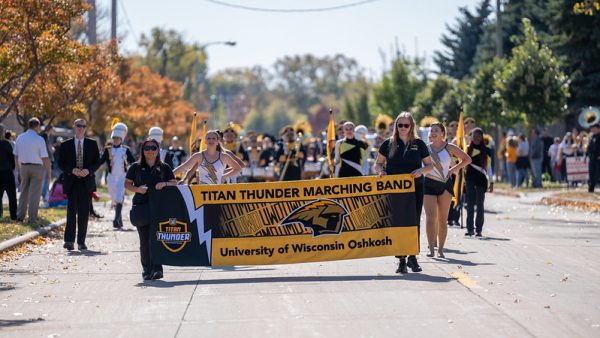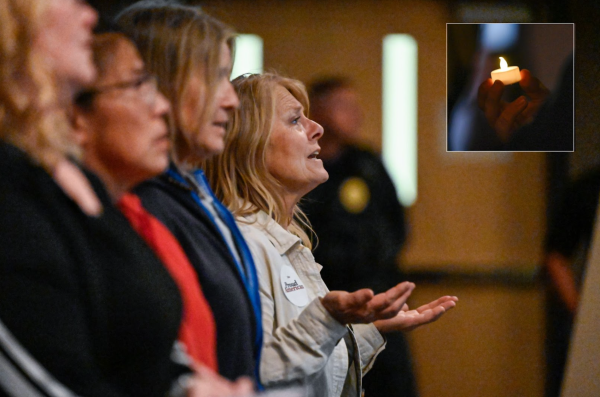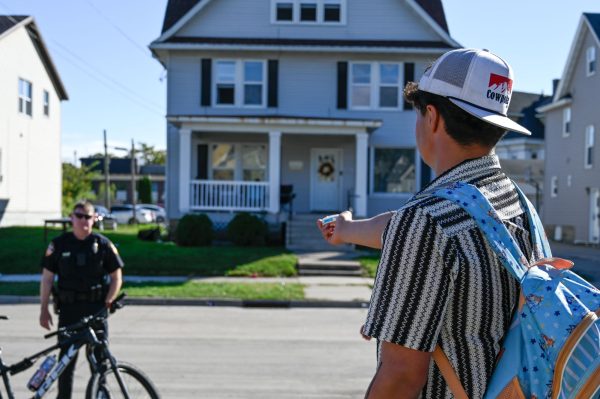Leavitt’s budget plan enters phase one
The three-phase fiscal plan UW Oshkosh Chancellor Andrew Leavitt announced on Jan. 29 is now out of its planning phase and living part one of the three-year plan.
The purpose of the plan as stated by Leavitt in his blog is to employ a three-phase fiscal plan to reduce general-purpose revenue spending by $9.5 million over the next two years. The goal by the second year of the plan was to raise a net of $1 million of on going revenue.
The plan is to cut academic spending by 30 percent in the first year, 50 percent in the second year and 20 percent in the third year. Non academic spending will be cut by 60 percent the first year and 40 percent in the second year.
Leavitt said the plan is on track and the first phase is going as expected.
“The reason why we are breaking up the academic spending cuts in three parts is because we understand the pressure it puts on departments, and we want it to affect students as little as possible,” Leavitt said. “We’ve done a really good job at making sure that it affects students as little as possible.”
Leavitt also said the University was able to bring in an additional 200 freshmen this semester.
“We’ve made sure that there are classes available for these incoming freshmen,” Leavitt said. “It would be irresponsible for us not to, to bring in 200 freshman with no classes available.”
Assistant Chancellor for Access Campuses UW-Fox Valley and UW-Fond Du Lac Martin Rudd said he is looking forward to seeing the University prosper.
“It’s an extremely good strategy, an extremely difficult strategy to deal with,” Rudd said. “The positive part on this, which comes out of any budget reduction, is any opportunity to look at where you can increase revenues on campuses as well; and that’s usually a positive and uplifting process because you can devise new strategies to try and create income streams.”
Rudd said he is impressed by Leavitt’s transparency during this process.
“At the convocation last week as well, he addressed a couple of things that are really hallmarks of his administration and his time as chancellor so far,” Rudd said. “I would say that transparency is among those highlights not only in the way he keeps up with the commentary and openness on the financial situation, which does require support, but I think it also shows in the culture of the Oshkosh campus as well, so I see that as a real strength of Chancellor Leavitt’s.”
Associate professor and Faculty Senate member Karl Loewenstein said he is worried about what will happen when we enter into the second year and 50 percent of academic spending is cut.
“For the first time in years, I have long waiting lists for all my classes, so obviously there is a shortage,” Loewenstein said. “I was talking to a student today who needs another course to get to her 12 credits and there are six people on the waitlist in front of her to get into my class. So these are the impacts of them not re-hiring faculty and that was the 30 percent year. So what’s it going to look like next year when you take another a million dollars out of the college budget? So those are the things that worry me.”
Loewenstein also said while progress is being made, he feels like faculty is still being left out in decision-making.
“Although we’ve become better about budgeting decisions on this campus, we are still kind of in the dark and we’re not having a public conversation with faculty and students about what the budgets look like,” Loewenstein said. “It’s frustrating because there are really big things coming down the pike and we don’t have any idea what’s going on.”
Oshkosh Student Association Vice President Stephanie Liechty said she values Leavitt’s openness with OSA but knows there will be challenges with the budget reduction.
“The chancellor and other administrators have taken the time to inform all members of OSA on multiple occasions, open forums, presentations at assembly and senate [meetings], etc.,” Liechty said. “They value the input of the students, which is very encouraging. Some challenges will be finding places to cut spending without sacrificing the integrity of our school. Benefits will speak for themselves as we see the progress of cutting down the deficit.”
Liechty said OSA will continue to support Leavitt during this process and encourages other students to do so as well.
“OSA supports anything that will keep the UWO campus at our high standards,” Liechty said. “OSA and all of its members are working tirelessly to make sure the voices of students are heard every step of the way on this process. We would suggest that any and all students get involved by joining campus committees, attending open forums and keeping governance bodies accountable and transparent.”
According to Loewenstein, the UW System is proposing all programs with less than five majors per year will result in the University being required to close those programs.
“If this happens, we won’t even get to decide whether it’s really important to have those smaller departments, which is really troubling,” Loewenstein said. “The way the model is supposed to work is that faculty is in charge of programs.”
Leavitt said he wants to do what is in the best interest of the students and faculty.
“I’m not sure on the details, whether or not this will happen, or if the University will be required to close these programs, but my concern is placed on the importance of the programs, the faculty input, not how many students are coming from these programs.”
Leavitt also said details on a new plan will be coming soon as well.
“For the first time in 45 to 50 years, we have something called a New Budget Plan, which I will be putting out a white sheet, an update, on these changes soon,” Leavitt said.







